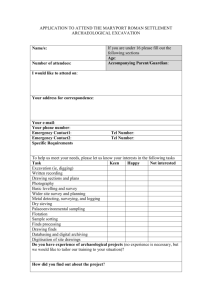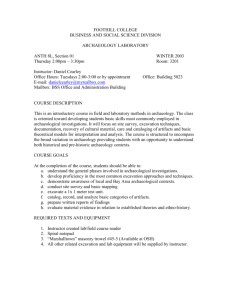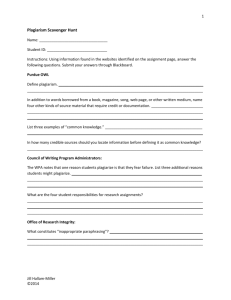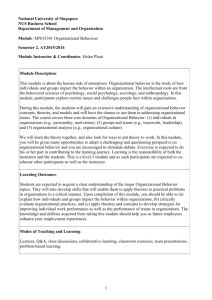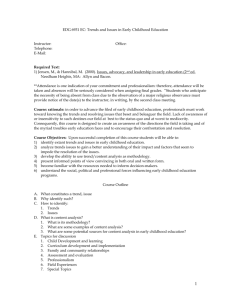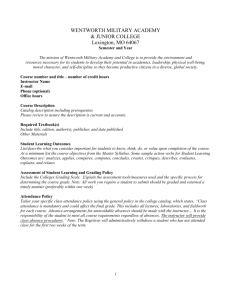Course Title - MacEwan University
advertisement
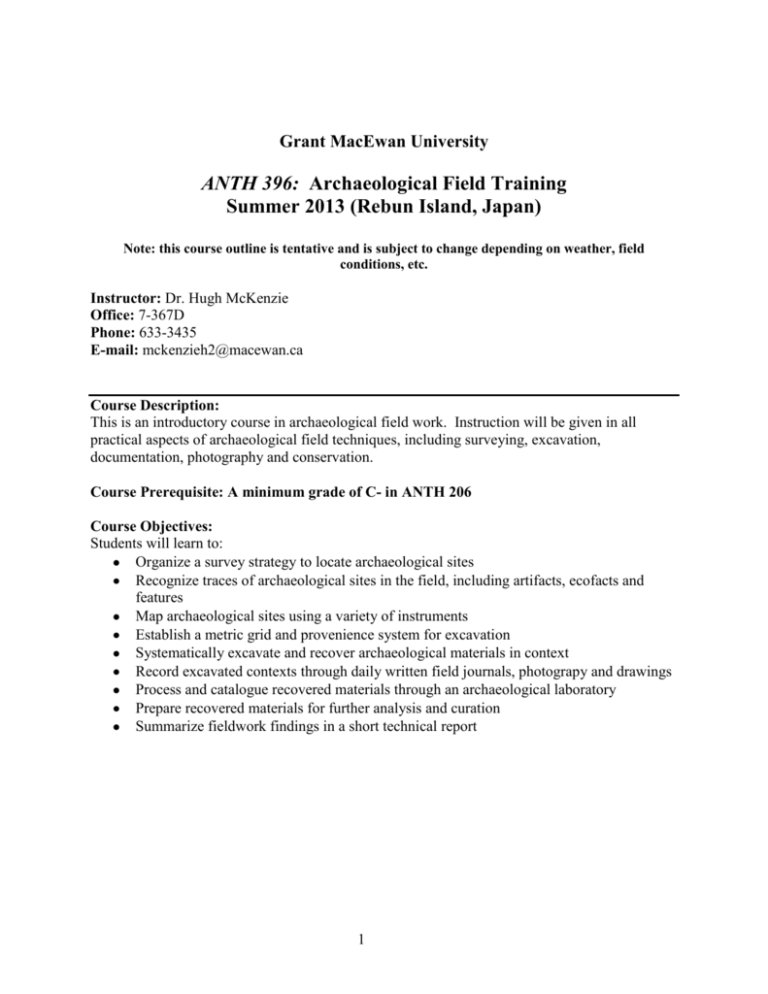
Grant MacEwan University ANTH 396: Archaeological Field Training Summer 2013 (Rebun Island, Japan) Note: this course outline is tentative and is subject to change depending on weather, field conditions, etc. Instructor: Dr. Hugh McKenzie Office: 7-367D Phone: 633-3435 E-mail: mckenzieh2@macewan.ca Course Description: This is an introductory course in archaeological field work. Instruction will be given in all practical aspects of archaeological field techniques, including surveying, excavation, documentation, photography and conservation. Course Prerequisite: A minimum grade of C- in ANTH 206 Course Objectives: Students will learn to: Organize a survey strategy to locate archaeological sites Recognize traces of archaeological sites in the field, including artifacts, ecofacts and features Map archaeological sites using a variety of instruments Establish a metric grid and provenience system for excavation Systematically excavate and recover archaeological materials in context Record excavated contexts through daily written field journals, photograpy and drawings Process and catalogue recovered materials through an archaeological laboratory Prepare recovered materials for further analysis and curation Summarize fieldwork findings in a short technical report 1 Grade Evaluation and Course Requirements: Orientation Training (in Edmonton) Quizzes: Excavation and Laboratory Strategies (in Japan) Daily Field Books Excavation Report Site Tour Presentations Field Skills & Conduct 5% 20% 25% 25% 10% 15% Archaeological Fieldwork Orientation On July 3 (in Edmonton), you will have a short but intensive orientation to the project goals, Hokkaido prehistory, mapping, field recording systems, artifact analysis, etiquette and safety prior to departure for the field location (Rebun Island, Japan). Delivery may include lectures, labs and field exercises. Attendance is absolutely mandatory and satisfactory completion will form 5% of your final course grade. From July 19-2, you will have another orientation in Sapporo that will provide you with further background on Hokkaido prehistory, artifact recognition, etc. Fieldwork. You will spend four weeks at the field site of Hamanaka-2, located in the small fishing village of Funadamori, on Rebun Island, Japan. Your time at the site will be divided between survey, excavation and lab work. In the field, you will be given intensive instruction and hands-on learning activities. This will include occasional orientation lectures/briefings, discussions and tours of your project area guided by you. During discussions, you will critically evaluate field methods and their application to the problems in your area of the site, as well as discuss your progress on a short field report you are responsible for preparing. In the lecture briefings you will be informed of the project’s goals, sampling strategies and technical methods. The lecture/briefings and discussions will form the basis of your quizzes (cumulatively worth 20% of your final grade), which may include both written and practical elements (dates TBA). The bulk of your time will be spent engaged in the skills of data collection, including most importantly, recording of your observations. Tours (10% of your final grade). Roughly once a week we will take a tour of the project area and you will explain what is being found in your work area and how you interpret it. I want you to think about what you are doing on a daily basis. This will be worth 10% of your grade. Field Book and Records (25% of your final grade). Each of you will keep a daily field work log. Details on what to include in the log will be discussed during orientation. I will review these mid-way through the project and grade their quality at the end of the field work (25% of your final grade) Field Report (25% of your final grade). During your time in the field you will write with a partner a short ‘technical’ report on either your survey, lab or excavation activities, outlining your methods and findings. Detailed instructions will be circulated separately. Yes, it can be hand written 2 Grade Criterion: Below are the percentage ranges and their grade equivalents for courses in Anthropology Grade Percentage Grade Points A+ 95-100 4.0 A 90-94 4.0 A85-89 3.7 B+ 80-84 3.3 B 77-79 3.0 B74-76 2.7 C+ 70-73 2.3 C 67-69 2.0 C60-66 1.7 D+ 57-59 1.3 D 50-56 1.0 F 0 -49 0 Please Note: 1. The official grading system at Grant MacEwan University is the 12-point letter grade system. While instructors may use percentages to aid in their grade development, percentages are not part of Grant MacEwan University’s official grading system. 2. A minimum grade of C- is required to receive university transfer credit or to satisfy a prerequisite for a higher level course. 3. Some university career programs will accept a grade of D. Late Policy: Note: a deduction of 10% will be made for every day that an assignment is late without a valid medical excuse. Assignments more than 1 week late will not be accepted. 3 Topics and Readings: In Class Training I Background to Baikal-Hokkaido Archaeology Project Background to Hokkaido Prehistory Background to Rebun Island Archaeology II Field Etiquette Japanese Culture III Site and Topographic Survey IV Establishing a metric grid Planviews Stratigraphy and profiles Soil and the Munsell Book V Artifact Recognition and Recovery Record Keeping 4 Weber et al. 2013-06-24 Topics and Readings: In the Field This list of topics and their order is to be considered tentative. It must be kept flexible to accommodate logistical changes in priority that typically arise. Hokkaido prehistory and material culture Sapporo Orientations Site formation, abandonment and disturbance processes Is this anything? Site recognition Survey Sampling Strategies & Remote Sensing Excavation & recovery strategies Photography Lab procedures Artifact analysis Faunal analysis Relative dating 5 Archaeological Equipment Required Small day pack Water bottle Hat and/or bandana Sunscreen 4-6” Pointing Trowel. I prefer the 4.5 or 5”, but anything up to 6” is fine. File, 6” Bastard Mill (to sharpen your trowel) Pencils, erasers, pencil sharpener, Fine Point Sharpie indelible marker Black ball point pens Small metric ruler (at least 10cm) Your textbook Optional , but recommended Small plastic toolbox to hold all your supplies Work gloves Small Pocket knife 2-3” hair paintbrush Small wooden sculpting tools / bamboo skewers Hand lens or loupe (10x) Small calculator Knee pads Camera Notebook for informal, personal observations – I will supply you with an ‘official’ field notebook, but this will stay with the project at the completion of the field work, so you may want your own notebook that you can take home with you. 6 Field School Policies Conduct: You will be interacting with other students, the local community, government representatives and officials, our Japanese colleagues and students, Ainu elders, and fellow lodgers for a prolonged period. It is important to maintain a professional demeanor with all. Some particular issues we want to avoid are as follows, Dress. Dress for safety, comfort and respect. You may be in the rain, in open fields and in a very small town all in one day. Drugs and alcohol. Possession of drugs will result in immediate dismissal from the course. Use alcohol in moderation and only in the evenings. There will be absolutely no drinking on site – violation will result in dismissal from the course. People in the community will also be watching your conduct. Act accordingly. Quiet time. You will be staying in a small family run hostel that is shared with other paying guests who are not part of our program. Your neighbours can hear you. You will also have roommates. Be respectful of everyone’s need for quiet in the late evening. Private property. We are guests in Funadamori, and our site is in somebody’s back garden. Do not cut across other people’s yards or enter into anyone else’s private property without permission. Hostel maintenance. Your hostel is your home. Everyone deserves a clean and safe home, and in Japan cleanliness is an expectation. Interaction with locals. You will be a very visible minority on Rebun Island. People will be curious about you and our project. Be friendly and share general information with them openly. If questioned pointedly about site locations or the value of the project, refer them to me. Remember also that you are a guest in someone else’s Culture, where there are different values and expectations. As anthropology students, you are expected to conform to local expectations even when these expectations may seem odd to you. If you have any particular concerns, please come to see me. Safety There are many potential hazards on an archaeological project. Here are some simple rules. Keep your work area tidy. Shovels and other tools are sharp and should not be left lying about. Be mindful of open holes. Look before you swing a shovel. Dirt is heavy. Think about how much you and your partners can lift before filling a bucket or screen. Do not swim alone. If you are going hiking, go with a partner and tell me where and when you intend to return. Do not take unnecessary risks. 7 Student Responsibilities: Students are expected to be aware of their academic responsibilities as outlined in the Students’ Rights and Responsibilities section in the University Calendar. 1. REGISTRATION STATUS: Students are responsible for ensuring the accuracy of their registration in courses. This can be checked at any time using Web Advisor. 2. WITHDRAWING FROM THE COURSE: Students who stop attending class must officially withdraw from the course. This must be done by the official withdrawal deadline for the course, which is available at the Registrar's Office. Failure to withdraw properly will result in a grade being assigned that is based on completed course work. 3. EXAMS: Your student photo I.D. is required at exams to verify your identity. At the discretion of the instructor, students may or may not be allowed to begin an examination after it has been in progress for 15 minutes. Students must remain in the exam room for at least 20 minutes from the time the exam commenced. Consumption of food is not allowed during exams. Electronic equipment, other than calculators, is not to be brought to exams and hats should not be worn. 4. MISSED EXAMS: When students miss an exam, test, or quiz the instructor should be notified of the reason within 48 hours. In general, some type of official documentation is required in order to obtain an excused absence. When students seek an excused absence because of illness, an official medical note is required. Medical notes must include: the date you were examined, a clear statement indicating that due to the severity of the illness you were unable to write the exam on the scheduled date, and the signature of the doctor (signatures by office staff on behalf of the doctor are not acceptable). Notes obtained subsequent to the date of the exam are generally not accepted. It is the student’s responsibility to keep up with class work when they are absent from class. Absence from class will not be accepted as a legitimate reason for failure to attend an exam on time. In addition to illness, acceptable reasons for an excused absence can include jury duty or military assignments. If a student misses the midterm because of illness (medical note required) or other circumstances approved by the instructor, then the student will receive an excused absence for the missed exam. The final exam mark (in percent) will then also be used as the midterm mark in the calculation of the final grade. No makeup exam will be given. 5. DEFERRED FINAL EXAMS: : Deferred examinations are only offered to students who have documented reasons deemed appropriate and formally approved by the Chair. (Note: According to university policy C2005, personal vacations are not a sufficient reason for a deferral to be granted.) Application for a deferred exam must be made within 48 hours from the missed final exam. If you know beforehand that you will be unable to attend the final exam at the scheduled time, the instructor must be informed prior to the final exam. 6. LATE ASSIGNMENTS: A deduction of 10% for every day that the assignment is late. 8 7. CELL PHONES: Cell phones are to be turned off during lectures, labs, seminars, and exams (except under exceptional circumstances in which approval has been granted by the instructor). 8. STUDENTS WITH DISABILITIES: Students who require accommodation in this course due to a disability are advised to discuss their needs with Services to Students with Disabilities located in the Student Resource Centre, and to advise the instructor(s). See Policy E3400 Students with Disabilities. Disclaimer: The information in this Course Outline is subject to change; any changes will be announced in class. 9 Academic Integrity at MacEwan MacEwan's Academic Integrity Policy (C1000) promotes honesty, fairness, respect, trust, and responsibility in all academic work. According to the policy, "Academic dishonesty involves participating in acts by which a person fraudulently gains or intentionally attempts to gain an unfair academic advantage thereby compromising the integrity of the academic process." Here are four common forms of academic dishonesty: Cheating on Tests and Examinations: Copying the work of others; or the use, or attempted use, of unauthorized notes, information, materials, study aids, or devices in any academic exercise or activity. Plagiarism: The use and submission of another's words, ideas, results, work, or processes without providing appropriate credit (ie. documentation). Multiple Submission: Submitting the same material for credit in two courses, without permission of the instructor(s). Improper Collaboration: Inappropriate sharing of work on an assignment that was intended as an individual assignment. Or when students work together in groups beyond the degree of permissible collaboration set out by the instructor. A more detailed description of types of academic dishonesty can be found in the Academic Integrity Policy. Students are responsible for understanding what constitutes academic dishonesty. All incidents of academic dishonesty are reported to and recorded by the Office of Academic Integrity. The penalties and sanctions for academic dishonesty include the following: a mark reduction up to zero on a piece of academic work a grade reduction up to an F in the course suspension or expulsion (with transcript notation) from the university 10 Avoiding Plagiarism Plagiarism is the use and submission of another's words, ideas, results, work, or processes without providing appropriate credit to the individual(s) responsible. According to the Academic Integrity Policy (C1000), plagiarism is one form of Academic Dishonesty, and it can result in a range of penalties and sanctions, the most common being a mark of zero on the piece of academic work. What constitutes plagiarism? Plagiarism is often misunderstood. It is not only the act of copying text word-for-word; plagiarism also occurs when a student hands in work done wholly or in part by another person portions of a submitted work are taken from another source without proper reference to that source a student paraphrases sections of another work without acknowledging the source ideas in a work are borrowed, derived or developed from another source without reference to that source (for example, "checking a few internet sites for ideas") How to avoid plagiarism The simplest way to avoid plagiarism is to reference any sources properly (using both in-text, parenthetical citations in the body of your assignment and a "Works Cited" or "References" page at the end). While it is commonplace in academia to build upon the knowledge of others, it is necessary to clearly state the sources and foundations of that knowledge. Referencing must conform to an accepted system of documentation (such as MLA or APA style). Penalties and sanctions for plagiarism Plagiarized work generally will receive a mark of zero. All instances of plagiarism are also recorded by the Office of Academic Integrity. Repeat instances of plagiarism will result in additional sanctions, such as a grade reduction, up to grade of F, in a course; or suspension or expulsion from the university (with transcript notation indicating " Academic Misconduct"). If you have any questions about plagiarism, please consult your instructor, a reference librarian, or the Office of Academic Integrity. https://www.dropbox.com/sh/7l0odimm2kd35ad/238fUmsXkI 11

